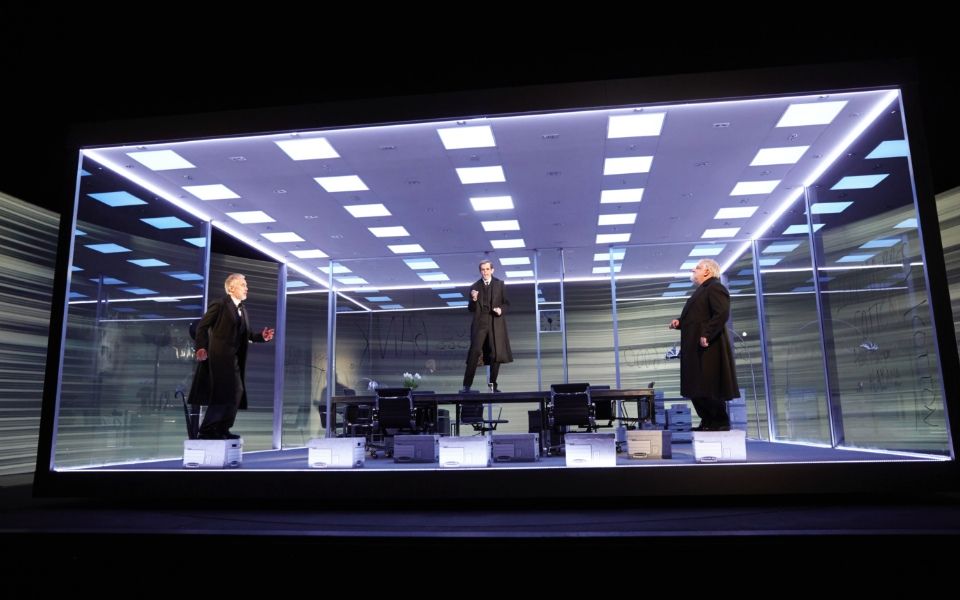The Lehman Trilogy at the national Theatre review: An astonishing play about the banking dynasty by a red-hot Sam Mendes

To a generation, Sam Mendes is synonymous with Oscar-winning Hollywood films, from the introspective dramas of American Beauty and Revolutionary Road to big budget blockbusters like Skyfall and Spectre. But his relationship with the stage is far more enduring, beginning a decade before his cinematic debut, and encompassing a stint as artistic director of the Donmar Warehouse.
In recent years his theatrical output has slowed, but the runaway success of last year’s The Ferryman – a near-perfect play in both text and execution – ensured Mendes remains the hottest ticket in the West End.
Even against this intimidating backdrop, The Lehman Trilogy is an outstanding achievement, a hypnotic three and a half hour journey through the history of the eponymous company, and through capitalism itself. Written by Italian Stefano Massini, the labyrinthine play was first performed in Paris in 2013, later transferring to Milan, although it’s hard to believe either could have topped this version.
Simon Russell Beale plays Henry, the first Lehman brother to land on American soil back in 1844, a poor Jewish immigrant with a little business acumen and a firm grasp of the American dream. He gravitates to Alabama, the centre of the lucrative cotton trade and, with his brothers Emanuel (Ben Miles) and Mayer (Adam Godley), who arrive in the following years, opens a small fabric business.
Their venture grows in tandem with the burgeoning United States economy, becoming a major cotton distributor, and later a bank and financial vehicle. The Lehmans became a family dynasty to be mentioned alongside the Guggenheims, Vanderbilts, Gettys and Rockefellers, their business surviving the end of slavery and two World Wars. Each generation of Lehmans seemed preternaturally able to gauge the prevailing winds of the economy, to invest in the next big thing, be it the railways, the leisure industry or financial instruments.
The three actors play not only the Lehman brothers and their descendants, but the entire roster of supporting characters; watching Beale segue from gruff elder statesman to a naïve female debutante – still clad in the same 19th century frock coat – is both laugh-out-loud funny and a masterclass in character acting. Godley’s transformation from spindly Mayer to wailing toddler is equally mesmerising.
The action all takes place in a rotating glass cube, an archetypal modern office, a ghost of the future calamity that would befall the company – and the world – haunting even the Lehmans’ earliest dealings. Throughout the three acts, characters scrawl on the glass with marker pen, creating a visual legacy of this most adaptable of family businesses.
The first act is a slow burn, with the story of Henry, Emanuel and Mayer given space to unfurl. As time jumps forward, so it speeds up. Projections curved around the rear of the stage shift from cotton-fields to cityscapes to blinking sheets of 1s and 0s. Reality eventually begins to peel away, replaced by a kind of grotesque expressionism, with the final member of the Lehman clan literally dancing his way into the grave, obsessed by the vast wealth he’s accumulated.
But this is no simple hit-job on the Lehmans, or even of capitalism. The brothers, their children and grandchildren are singularly focussed, often socially inept, at times brutally efficient, but they’re likeable and human, with a deeply-held spirituality that give the events the air of religious allegory. They helped to create a world that lost its head, but there’s a sense of tragedy, of inevitability, of loss and sadness.
When the crash of 2008 eventually comes, it has weight and resonance. I found myself willing it not to happen, not for the sake of the world as we knew it, but because I didn’t want this wonderful play to end.
